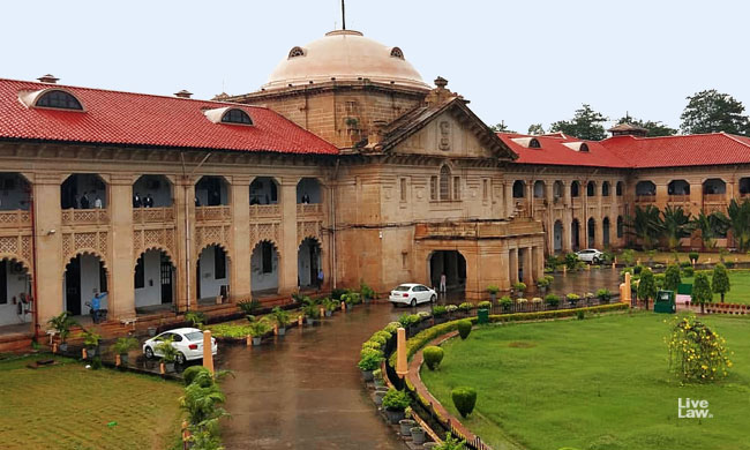- Home
- /
- News Updates
- /
- Allahabad High Court Denies...
Allahabad High Court Denies Daughter's Custody To Mother Accused Of Murdering Husband, Grants Liberty To Seek Custody Once Acquitted
Sparsh Upadhyay
3 March 2021 8:36 AM IST
It would be irreversibly unsettling and debilitating in her formative years. It may even expose her to insurmountable trauma if she witnesses her mother, whom she is bonded with, convicted in the case of her father’s murder: Allahabad High Court
In an important ruling, the Allahabad High Court last week refused to hand over the custody of a two-year-old daughter to the petitioner-woman who has been accused of murdering her husband (i.e., child's father). The Bench of Justice J. J. Munir, however, gave the mother the liberty to seek daughter's custody in the event she is acquitted by judgment based on doubt or...
In an important ruling, the Allahabad High Court last week refused to hand over the custody of a two-year-old daughter to the petitioner-woman who has been accused of murdering her husband (i.e., child's father).
The Bench of Justice J. J. Munir, however, gave the mother the liberty to seek daughter's custody in the event she is acquitted by judgment based on doubt or otherwise.
The matter before the Court
A petition for writ of habeas corpus was instituted by the Petitioner/Mother (Gyanmati Kushwaha) asking that her minor daughter be ordered to be produced before the Court and the daughter be entrusted into her (Petitioner-mother's) care and custody.
Facts in brief
Petitioner/Mother Gyanmati Kushwaha is currently facing trial as a co-accused in the case relating to her husband's murder.
As alleged by the Petitioner, she had been implicated in her husband's murder at the instance of Kamal Kushwaha (husband's maternal uncle).
She was remanded to judicial custody on 16th May 2018, and at that time, Kamal snatched away Drisha from her.
It is said that at that time, Drisha had not yet been weaned away, but still, Gyanmati was deprived of her daughter's care and custody, while in jail. She applied for bail and was released from prison on 10th September 2018.
After her release on bail, she asked Kamal Kushwaha (husband's maternal uncle) several times that she may be handed back her daughter's custody, but he refused to do so.
Arguments put forth
Petitioner submitted before the Court that she is Drisha's mother, and the only surviving natural guardian, after her husband's death.
The petitioner contended before the Court that under the provisions of Section 6(a) of The Hindu Minority and Guardianship Act, 19562, the mother has the right to the custody of a minor child until the age of five years ordinarily, which is quite apart of her right to the minor's natural guardianship.
It was also submitted that presently Suresh Kushwaha (Drisha's grandfather) is having the custody of the minor daughter and that it is absolutely not in the minor's welfare to entrust her custody to the grandfather, while the mother is around.
On the other hand, the opposite parties submitted that she would not be entitled to Drisha's custody, because she is an accused in the case relating to her husband's murder, along with co-accused, who has been dubbed as her paramour, and other associates.
It was argued that she is facing trial for her husband's murder, and if convicted, the child's life might be ruined.
Court's observations
At the outset, the Court observed that the law would not certainly countenance custody of a minor to be handed over to a parent who is an undertrial, in connection with the other's murder, and that too, on a charge of conspiracy with a paramour.
On the other hand, the Court noted,
"It is the mother's right to her child's care and custody, and the child's right, in turn, to her mother's love and affection, which the law takes care of to the extent that if the mother were in jail in an unrelated matter, young children up to the age of five or six years, depending on different jail rules in the various states, are allowed to stay in prison with the incarcerated mother."
Significantly, the Court observed that the statutes may speak about the right of one parent or the other to custody, or the right of guardianship, but, in substance, it is not at all about the right of a guardian to the minor's custody, or guardianship; it is all about the minor's welfare.
Coming to the facts of the Case, the Court opined that if the mother were to be convicted, the minor's welfare would be thrown into disarray.
"It would be irreversibly unsettling and debilitating in her formative years. It may even expose her to insurmountable trauma, if she witnesses her mother, whom she is bonded with, convicted in the case of her father's murder", remarked the Court.
The Court further noted that the possibility that the mother might truly be a conspirator in her husband's murder, predicates a personality that would not be beneficial for the minor in grooming her about her moral values - a very important aspect of a child's welfare.
On the other hand, the Court remarked,
"If the mother is innocent and she is acquitted, the loss, the minor would suffer on account of deprivation of her mother's care and custody, cannot be re-compensated, but nevertheless, it is a reverse that must be accepted for the minor's surer welfare, in preference to a contingent better, fraught with risk."
With this, giving her the liberty to approach the appropriate court in the event, she is acquitted of the charges of murdering her husband, the Court dismissed the Plea.
Case title - Gyanmati Kushwaha and another v. State Of U.P. And 4 Others [Habeas Corpus Writ Petition No. - 1217 of 2019]
Click Here To Download Order/Judgment
Read Order/Judgment


